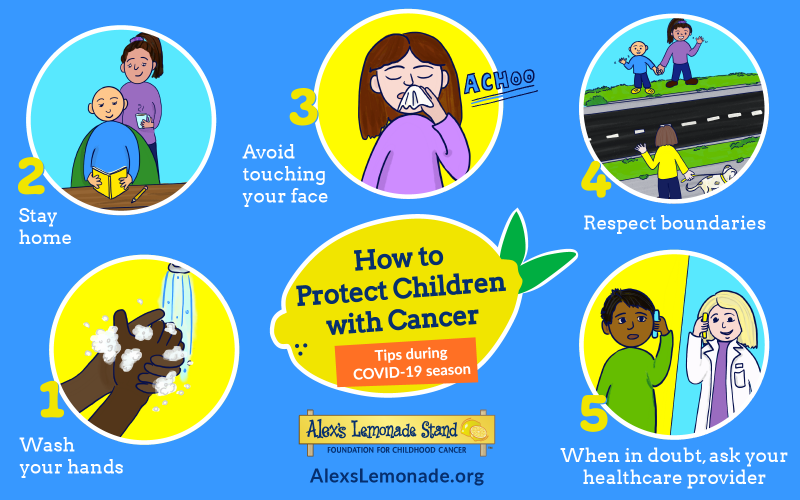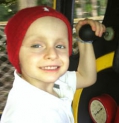
By: Anna Greene, PhD, ALSF Director of Science
As the world locks down during the global COVID-19 pandemic, childhood cancer families are faced with a double dose of uncertainty: their children are battling cancer and consequently have a greater risk of infection because their cancer treatments may weaken their immune system.
Intensive therapies used to treat many childhood cancers suppress the immune system. For example, chemotherapy kills rapidly dividing cells, such as cancer cells, but along the way it also kills normal cells too, including those of the bone marrow. Bone marrow contains red blood cells, white blood cells and platelets. White blood cells help to fight infections, and when they are destroyed during chemotherapy, this puts kids with cancer at risk because their bodies may not have enough white blood cells to combat illnesses.
Childhood cancer survivors are also at risk due to side effects from their life-saving treatments. This is why it is incredibly important for everyone to help slow the transmission of the virus: to keep safe those who are most at risk during this time.
There are a lot of terms related to COVID-19 and childhood cancer that you may have heard recently. Below we define some of the more common ones to help you better understand childhood cancer during the COVID-19 pandemic:
COVID-19: the abbreviation for the “coronavirus disease 2019”, a new coronavirus that produces a respiratory illness and has infected individuals all over the world. Because it’s a novel virus, we lack immunity to it.
Pandemic: COVID-19 has become a pandemic because it is a rapidly spreading, new infectious disease that is now found worldwide.
Immunocompromised: having a weakened immune response to fight infections and/or diseases. Kids with cancer may be immunocompromised because of the therapies used to treat their disease which may make them more susceptible to illnesses.
White Blood Cell Count (WBC): white blood cells are the body’s defense against germs. A complete blood count panel provides a WBC which measures the white blood cells present in the blood. The WBC is needed to calculate the Absolute Neutrophil Count (ANC).
ANC (Absolute Neutrophil Count): a measure of immune response and the ability for the body to fight infection. Neutrophils are the most abundant white blood cell, and the Absolute Neutrophil Count (ANC) provides a count of cells that are available to fight infections. A common side effect of chemotherapy and/or radiation is neutropenia, a drop in the ANC. The lower the ANC drops, the greater the risk for infection, and a low ANC (count below 500) indicates the highest risk for infection.
Social Distancing: the act of physically distancing from others to help prevent the spread of COVID-19. This means staying home as much as possible, avoiding crowds and maintaining a distance of at least 6 feet from other people when outside your home. The goal of social distancing is to “flatten the curve” by slowing the spread of COVID-19 so that hospitals are not overloaded at any given time and have beds available for those who need them most. Slowing the spread of COVID-19 also gives researchers more time to discover and test therapies to treat the virus.
Personal Protective Equipment (PPE): the equipment needed for health professionals to safely care for patients, such as gloves, gowns, eye protection, face shields, and face masks, such as N95 masks. Immunocompromised individuals such as kids with cancer and their families may also need to wear PPE such as masks to protect themselves from infection. Unfortunately PPE supplies have become very difficult to purchase, making it challenging for childhood cancer families to find protection. Additionally, hospitals are in dire need for more PPE during this time.
Handwashing versus Hand Sanitizer: washing your hands with soap and water is one of the best preventative measures you can take to prevent illness. Washing with soap and water removes the most germs when compared with using hand sanitizer. Hand sanitizer isn’t able to kill all types of germs, but should be used if soap and water are not available, as long as the sanitizer contains at least 60% alcohol.
We can all help the most vulnerable during this time. Here are three ways you can help right now:
- Because there are no approved therapies for COVID-19 right now, preventing infection is the best way to protect kids with cancer. Read our tips for how to keep children with cancer safe.
- Through social distancing to slow and prevent the spread of COVID-19 and donating any unused masks or other personal protective equipment that you may have to hospitals that are in urgent need.
- Contribute to the Alex’s Lemonade Stand Foundation COVID-19 emergency fund that helps families during this critical time. To properly address the issues families are facing, this fund provides extended hotel stays, grocery assistance and travel support.

